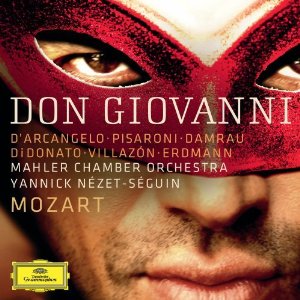I suspect that a better-cast Don Giovanni than this one would be hard to find nowadays. With ideal or near-ideal singers in six of the eight roles, this recording has to be considered among the best available, and I’m going all the way back to Böhm and Giulini. But to be honest, we must deal with Yannick Nézet-Séguin, the conductor. He is a fine leader in Romantic operas, and here he does nothing noticeably wrong and the work never seems museum-bound. He generates a good amount of heat when needed (you sense this even in mid-overture, and the feeling is intensified in, say, Anna’s recit before “Or sai chi l’onore”); he is gentle in tender moments (a “Dalla sua pace” and “Vedrai carino” of great loveliness), but he offers no profile for the opera as a whole.
Happily, his singers are truly dramatic animals, and each of them gives us a vivid portrait, but the feeling is that they are leading him rather than the other way around. The Mahler Chamber Orchestra plays handsomely and with great nuance, and that should be enough, but you get the feeling that there was no over-riding decision about appoggiaturas, embellishments, use of rubato, etc.—each singer had his or her ideas and they were permitted. But I am carping; and once you experience the wisely emphasized inner voices of the orchestra, terrific wind playing, suppleness, and mostly marvelous singing, you’ll be swept away.
Best are the “Donnas”, the finest pairing since Sutherland and Schwarzkopf. Diana Damrau, the Donna Anna, is a high coloratura, as was Sutherland, though her sound is certainly slimmer. Both Martina Arroyo and Birgit Nilsson recorded the role; a heavier sound is permitted and may even be preferred. But Damrau is second to none: the fast music is phenomenal, as one might expect (including, in fact, a wild, impeccable riff at the end of “Or sai…”), but so are her exclamatory moments—vivid, full of character, and with all the mood changes anyone might desire. And if there is a greater Elvira on disc than Joyce DiDonato, I’d love to hear her. In this notoriously tough role to cast, DiDonato catches everything: the craziness, the desperation, the sadness (“Ah, taci ingiusto core” is gorgeous). She also catches all the notes, from top to bottom, fast, slow, long and short, all sung with a commitment that is fabulously intense. Her second-soprano sound never has been used to better effect: a perfect performance.
Bass Ildebrando D’Arcangelo has a very dark tone and it is occasionally lugubrious; his second-act Serenade sounds weirdly glum and more like a lullaby. It is peculiarly accented—he could have used Karl Böhm’s guiding hand. But aside from the occasional crooning, he can be quite dazzling: “Finch’an del vino”, coming in at a staggering 1:14, is almost a study in madness, and so are his huge, repeated “Viva la liberta(s)” moments later. I missed true danger, however, and genuinely feel that this role should be sung by a lighter voice. And his voice is very different from that of the brighter-toned Luca Pisaroni as Leporello, who delivers a Catalog Aria more seductively (trying to “be” the Don?) than sarcastically. Together the two men work well, with fine give-and-take both outside the house in the first act and in the cemetery and at dinner in the last.
A surprisingly ideal reading comes from tenor Rolando Villazon as Don Ottavio. Back from a series of vocal crises, Mozart is like a balm to his voice, and his unique, thoughtful way of phrasing rarely has been put to better use. “Dalla sua pace” is caressing in new ways (even if you have your favorites), and yes, he has both the coloratura and the spectacular long breaths for “Il mio tesoro”. He really seems to listen to Anna when she speaks to him, and his slightly nasal tone is, somehow, wonderfully evocative, humanizing, and strong. Konstantin Wolff is a more sharply delineated Masetto than usual and he sings smoothly.
The two duds are an underpowered Commendatore from Vitalij Kowaljow (one would have welcomed a megaphone or some other gimmick for the final scene) and the squally Zerlina of Mojca Erdman, who decorates her second aria and sounds like a voice student gone wild: here is where a strong conductor would have slapped a singer’s face. The verdict? This Don may have a profile that’s neither golden age, classical, nor mistakenly Romantic, but it thrills time after time with (many of) its singers’ commitments and golden-age voices. Give it a serious listen, but do not discard, say, your Giulini (EMI), Gardiner (Archiv), Jacobs (HM), Mitropoulos (Sony, nla) or even the Krips (Decca). Whew!
































